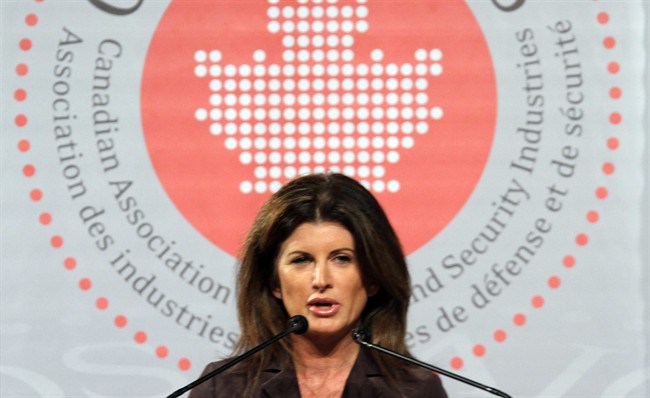OTTAWA – The Conservative government wants lobbyists to butt out of Canada’s new shipbuilding industry.

Public Works Minister Rona Ambrose managed to raise more than a few eyebrows at a large defence industry trade show in Ottawa on Wednesday with that pronouncement.
She told a large gathering of defence industry insiders, military officials, business leaders – and lobbyists – that the government doesn’t want lobbyists to play a role in Canada’s new National Shipbuilding Procurement Strategy.
“Companies involved in the NSPS implementation process have been asked not to engage lobbyists. It was our intention at the outset to ensure that the NSPS competition would be run through a process that is completely arms length of politics,” Ambrose told hundreds in her luncheon speech.
The government has already held consultations with industry association representatives and chief executives of large companies on the future of Canada’s shipbuilding industry, she said.
“Our government’s commitment to ensuring fairness and openness and transparency is clear. Whether shipyards are successful or not will depend 100 per cent on the merits of their proposals.”
The remarks were the latest example of the Harper government’s tough stand against lobbyists, the powerful backroom brokers who open doors for the various interests that want to do business with government.
The Conservatives have curtailed the ability of lobbyists to work on political campaigns and have also imposed a cooling off period that prevents political staffers from immediately working as lobbyists when they leave politics.
The Conservatives have faced by allegations of influence pedalling by former Harper aide Bruce Carson and defeated MP Rahim Jaffer.
Ambrose’s statement will likely anger the thousands of registered lobbyists who make their living in government relations and communications. Several lobbyists and communications experts, as well as top business leaders, said they were surprised by Ambrose’s statement but none would speak on the record.
Ambrose went into great detail on how the government plans to keep the sometimes messy business of military procurement on the straight and narrow when it eventually selects two shipyards as the prime contractors for the $35 billion, 20-year national shipbuilding strategy it announced last year.
A National Shipbuilding Procurement Strategy Secretariat is headed by Public Works, and is “the workhorse of the governance structure looking after the day-to-day running of the process,” she said.
The deputy minister of Public Works heads a high level decision-making committee that also includes deputy ministers from the Defence Department, Fisheries and Oceans and Industry Canada.
“This innovative and very robust structure safeguards the process and reduces the possibility of complaints and legal action by providing additional layers of validation and oversight, a streamlined issues resolution ladder and enhanced industry engagement,” said Ambrose.
The government has hired an oversight firm, KPMG, to help develop selection criteria and processes that are reasonable and defendable, she said.
It has also hired First Marine International, the British marine industry consultancy, to help judge the final shortlist of bidding Canadian shipyards, she added.
Ambrose said the government is serious about streamlining the long, complex military procurement process, saying the average wait time for contracts has been cut in half since the Conservatives came to power in 2006.
The government’s recent replacement of 17 new Hercules transport planes took 18 months instead of target 48 months, she said.
“The game has changed and I can tell you that your industry will benefit.”
One of the biggest projects for Canada’s new shipyards will be replacements for the navy’s frigates, the country’s main warships.
A planned replacement, the Single Class Surface Combat ship, would see different kinds of warships built on top of the same basic hull design.




Comments